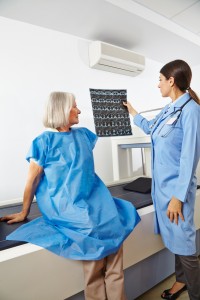 Results from a recently concluded survey were published by the Society for Women’s Health Research (SWHR) and revealed most women (4 out of 5) feel health facilities should provide mammograms and diagnostics that are more sensitive and accurate to minimize the chances of having to report back to the clinic for abnormal mammogram readings.
Results from a recently concluded survey were published by the Society for Women’s Health Research (SWHR) and revealed most women (4 out of 5) feel health facilities should provide mammograms and diagnostics that are more sensitive and accurate to minimize the chances of having to report back to the clinic for abnormal mammogram readings.
The survey revealed 47% of women were called back to the clinic for further testing after they underwent a mammogram. These incidents caused additional stress and fear in women who were already anxious about developing breast cancer.
Last September, the SWHR surveyed 3,501 women as young as 18 years old in order to gain a better understanding of how women think of and feel about breast cancer screening, including several psychological factors such as motivation, barriers, emotional impact, and expectations. Participants’ knowledge on these tests, particularly on mammograms, were gauged, which revealed a large number of women believe a more accurate 3D mammography should become the standard for screening, and should be covered by insurance. In fact, two-thirds of those surveyed said they would consider switching to an insurance company that covered more advanced health screening technology.
“Our mission is to use this research to spark a dialogue about what women really want when it comes to mammography – a perspective that, unfortunately, is all too often missing from the conversation about breast cancer screening and prevention. … By better understanding the concerns and challenges that today’s women face, we are hopeful that we can help policymakers and health care providers align both access and payment with real patient needs.” Phyllis Greenberger, MSW, President & CEO, Society for Women’s Health Research, said in a press release.
[adrotate group=”3″]
 The survey also discovered a contradicting trend, in that 78% of respondents were aware of the importance of having an annual mammogram, but only 54% complied with this recommendation from the American Cancer Society. Two of the identified obstacles for compliance were mammograms’ high cost and inadequate insurance coverage. Other factors included non-medical costs such as transportation and availing of childcare during the time of the scheduled test.
The survey also discovered a contradicting trend, in that 78% of respondents were aware of the importance of having an annual mammogram, but only 54% complied with this recommendation from the American Cancer Society. Two of the identified obstacles for compliance were mammograms’ high cost and inadequate insurance coverage. Other factors included non-medical costs such as transportation and availing of childcare during the time of the scheduled test.
Other findings from this survey were as follows:
- 64% of women do not have an adequate understanding of the benefits of mammography
- 68% of women are unaware the Affordable Care Act mandates Medicare and commercial health insurance completely covers preventative services
- 56% of women feel their provider’s recommendation is the most impactful factor in scheduling a mammogram
To learn more about this survey, you can visit the SWHR website, and follow the official hashtag #mammorealitycheck on Twitter.

